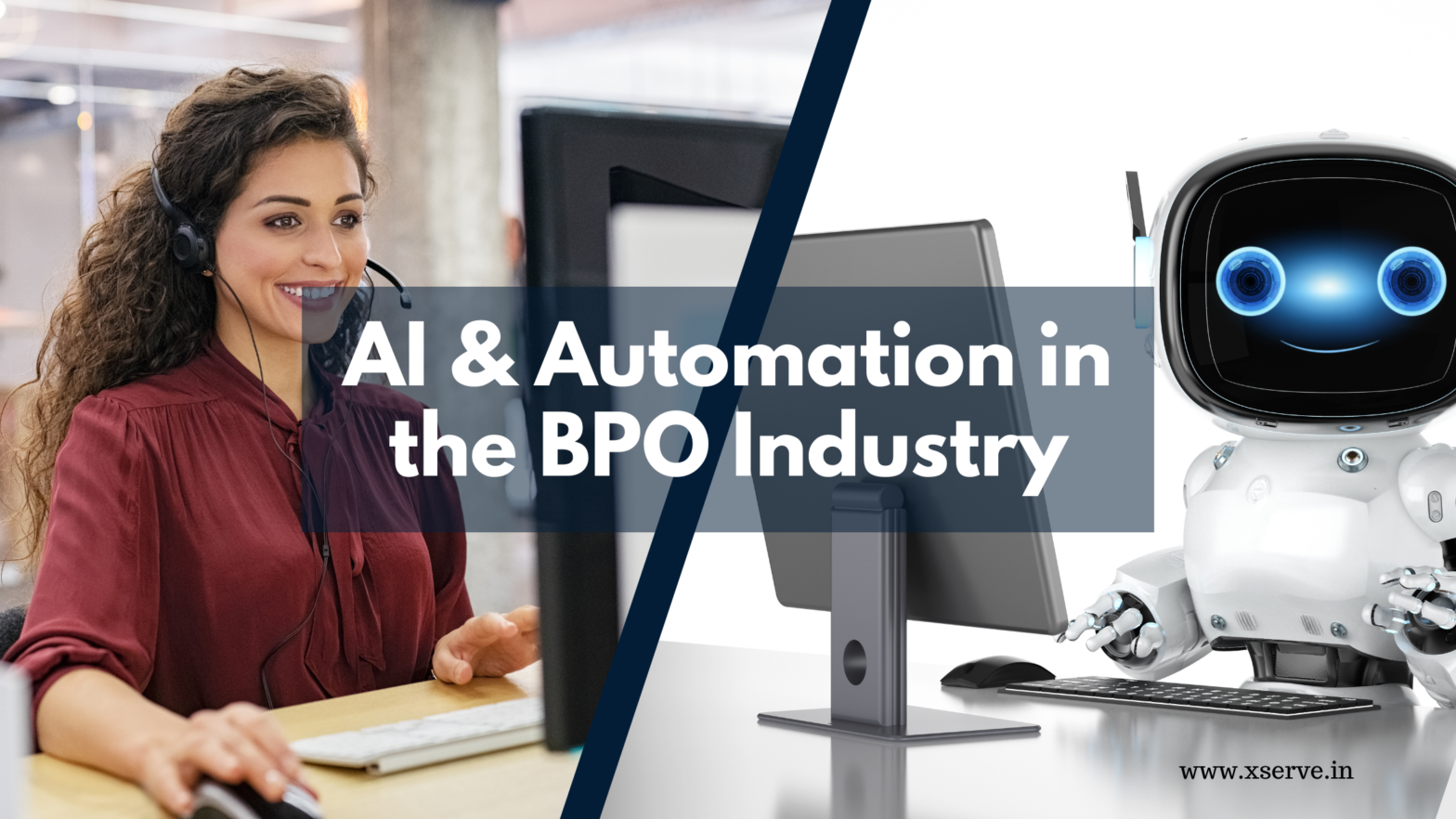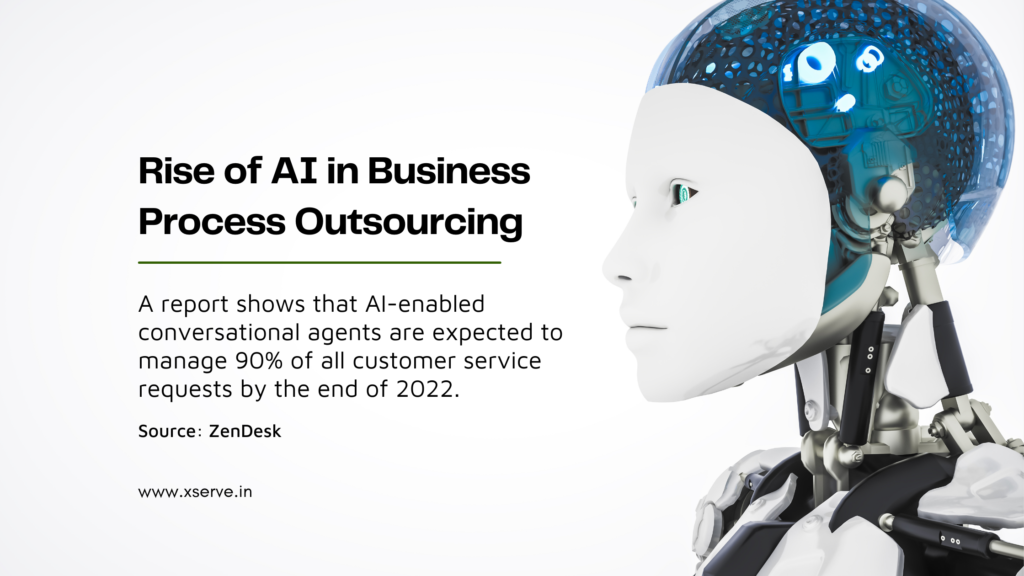Revenue in the Business Process Outsourcing market is projected to reach US$0.37tn in 2024 (Source: Statista). The outsourcing industry has long been a cornerstone of efficient business operations. By delegating tasks to skilled workforces abroad, companies have achieved cost savings, improved scalability, and accessed specialized expertise.
However, the landscape is undergoing a significant transformation fuelled by the relentless march of Artificial Intelligence (AI) and automation.
The value of AI in the workplace goes beyond automation. It is about augmenting human intelligence, enabling workers to make better decisions, and fostering a culture of innovation and creative problem-solving.
Ginni Rometty, former CEO of IBM
This blog post delves into the impact of AI and automation on outsourcing, exploring both the opportunities and challenges they present.
We’ll discuss how AI in BPO is reshaping the outsourcing landscape, analyse the evolving skill sets required, and outline best practices for navigating this changing environment.
Finally, we’ll peer into the future, exploring emerging trends that will redefine the way we outsource in the years to come.
AI’s Impact on Outsourcing: A Multifaceted Transformation
The integration of AI into outsourcing is multifaceted, impacting various aspects of the industry. Let’s explore some key areas of transformation:
- Automating repetitive tasks
- Enhanced data analysis and decision making
- The rise of AI-powered assistants
- Quality assurance and fraud detection
- Hyper specialization and up-skilling
1. Automating Repetitive Tasks:
AI excels at automating repetitive, rule-based tasks that were traditionally outsourced. Data entry, basic customer service inquiries, and back-office processes are prime examples.
This frees up human workers for more complex tasks requiring critical thinking, creativity, and emotional intelligence.
Sekhar Garisa, CEO of foundit, predicts the impact on low-skilled service sector jobs due to AI: “In the immediate to short term, 7% of low-skilled service sector workforce will be replaced by AI.”
2. Enhanced Data Analysis and Decision-Making:
Outsourcing providers are leveraging AI to analyze vast amounts of data in real-time.
This empowers them to identify trends, predict customer behaviour, and make data-driven decisions that optimize workflows and improve service delivery. AI-powered analytics can also be used to identify areas for cost reduction within the outsourcing ecosystem.
3. The Rise of AI-powered Assistants:

Chatbots powered by AI are transforming customer service outsourcing. These virtual assistants can handle routine inquiries, schedule appointments, and provide basic troubleshooting, freeing up human agents for complex issues requiring personalized attention.
4. Quality Assurance and Fraud Detection:
Machine Learning algorithms are being used to monitor and evaluate service quality, ensuring consistent performance from outsourced teams.
Additionally, AI can identify anomalies in data patterns, helping to detect and prevent fraudulent activity within the outsourcing process.
5. Hyper-specialization and Upskilling:
While AI automates routine tasks, it also creates a demand for human expertise in specialized areas.
The future workforce will require a blend of technical skills (data analysis, AI literacy) and “soft skills” (critical thinking, problem-solving, communication). BPO providers will need to upskill their workforce to cater to this evolving demand.
The Evolving Skillset: Human + Machine Collaboration

The rise of AI doesn’t signal the end of human involvement in outsourcing. Instead, it necessitates a shift towards human-machine collaboration.
The future of the BPO industry lies in leveraging AI for repetitive tasks and freeing up human workers to focus on high-value activities that require:
- Critical thinking and problem solving
- Creativity and innovation
- Emotional intelligence and empathy
- Domain expertise and industry knowledge
Critical Thinking and Problem-Solving:
AI excels at following predefined rules but struggles with novel situations. Human expertise will be crucial for tackling complex problems, identifying solutions, and adapting to changing circumstances.
Creativity and Innovation:
AI can mimic existing patterns but lacks true creative ability. Human ingenuity will be vital for developing new service offerings, streamlining processes, and finding innovative solutions to optimize the outsourcing experience.
Emotional Intelligence and Empathy:
Building relationships with clients and customers requires human skills like empathy, active listening, and emotional understanding. These are crucial for providing exceptional service that cannot be replicated by AI.
Domain Expertise and Industry Knowledge:
Deep understanding of a specific industry or domain will be invaluable in the future. Human workers can leverage their knowledge to interpret data, tailor solutions, and provide expert advice to clients.
BPO providers must invest in training programs that equip their workforce with the skills needed to thrive in this evolving landscape. This includes technical training in AI and data analysis, as well as soft skills development programs that hone communication, problem-solving, and critical thinking abilities.
Best Practices for Navigating the AI-powered BPO Landscape
For businesses seeking to optimize their outsourcing strategy in the age of AI, here are some key best practices:
- Identify Tasks Suitable for Automation: Carefully analyse your outsourcing needs and identify repetitive, rule-based tasks that can be effectively automated through AI.
- Invest in AI-powered Tools and Technologies: Partner with BPO providers who have integrated AI and automation into their offerings. Look for providers utilizing AI for data analytics, quality assurance, and intelligent chatbots.
- Focus on Human-Machine Collaboration: Don’t view AI as a replacement for human workers but rather as a powerful tool for augmentation. Leverage AI to empower your outsourced team to focus on high-value activities.
- Data Security and Governance: As AI relies heavily on data, ensure your BPO provider has robust
Conclusion: Embracing the Future of AI-powered Outsourcing

The integration of AI and automation is undoubtedly reshaping the outsourcing landscape. While some tasks will be automated, the human element remains irreplaceable. The future of BPO lies in fostering a collaborative environment where AI empowers human expertise.
Key Takeaways:
- AI is automating repetitive tasks, freeing up human workers for more complex activities requiring critical thinking and creativity.
- BPO providers are leveraging AI for data analysis, decision-making, and quality assurance, leading to optimized workflows and improved service delivery.
- While AI excels at specific tasks, the future demands a blend of human and machine capabilities.
- Businesses should focus on fostering human-machine collaboration and leverage AI as a tool for augmentation.
- Upskilling the workforce with technical and soft skills is crucial for success in the AI-powered BPO landscape.
By embracing AI in BPO and fostering a skilled, human-centric workforce, businesses can unlock the full potential of outsourcing in the years to come. The future of outsourcing is not about replacing humans with machines but about leveraging the strengths of both to achieve greater efficiency, innovation, and client satisfaction.
Stay tuned for future blog posts where we delve deeper into specific applications of AI in outsourcing and explore emerging trends that will define the industry in the years ahead.



1 comment